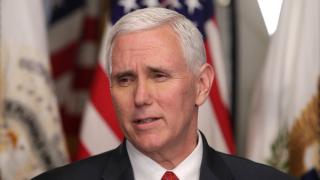Australia’s popular standing in Washington DC is at a high-water mark following the infamous Trump–Turnbull phone call. There’s immense goodwill towards Australia, but that hasn’t yet translated to a formal re-evaluation of the US–Australia alliance in the Trump era.
I left Washington last week reassured by Americans’ effusive attitudes towards Australia, but concerned about some themes in US thinking about the alliance. During a series of meetings in Washington alongside my US Studies Centre colleagues, we found that think tankers, congressional staff and government officials were deeply interested in an alliance that they’d perhaps treated with some complacency towards the end of the Obama presidency.
Yet our interlocutors tended to underappreciate the magnitude of the ‘Trump factor’ that has shaken geopolitical assumptions outside the United States. I was struck by the general sense that allies’ behaviour would remain consistent; that the US–Australia alliance was ‘fixed’.
The logical extension of that thinking—which was expressed repeatedly by Republicans, Democrats and public servants alike—was that Australia, as a staunch US ally, would participate in US wars as it had in the past. As such, it’s incumbent upon the Prime Minister, Foreign Minister and Opposition Leader to ensure that Vice President Pence leaves Sydney this weekend with no illusions about how Australians perceive Mr Trump.
In my meetings, there was particular interest in the extent to which Australians adored Barack Obama and oppose Donald Trump (a June 2016 Pew survey showed 84 per cent trusted Obama to do the right thing in world affairs, while a staggering 87 per cent of Australians had ‘no confidence’ in then-candidate Donald Trump). Most were unaware of the depth of anti-Trumpism in Australia and the consequent unravelling of a decade of unquestioned bipartisan consensus on the alliance. They were far more attuned to Australia’s ongoing US–China debate than the standalone, Trump-induced, broad-ranging discussion of the US alliance.
The biggest risk for American stewards of the alliance is that they turn off the Australian public by placing undue emphasis on ‘shared sacrifice’ and Australia’s unique record as the only country to have fought alongside the United States in every war since World War I. That language won’t be well received by the Australian public in the Trump era, due to perceptions that the President is reckless and the underlying sense that Australia shouldn’t automatically engage in wars that may turn out like Vietnam or Iraq. But shared sacrifice is the first thing America’s political class mentions when they speak about Australia. Americans’ deep gratitude for Australian military service was on full display when Congress rallied around Australia after the Trump–Turnbull phone call.
Congress is revitalising its support for Australia. The Friends of Australia Congressional Caucus, which was established in 2003 to assist with the passage of the Australia–US Free Trade Agreement, will be relaunched in coming months. At the behest of Ambassador Joe Hockey and Australia’s congressional allies like Senator John McCain, a powerful constellation of Republicans and Democrats from both the House and the Senate will be a helpful group for Australia on Capitol Hill.
Congress has a far more traditional view of US foreign policy and alliances than the Trump administration. Even though Congress has only blunt instruments at its disposal, its vision for the region aligns closely with Australia’s on most issues, except human rights. Both Congress and Australia are concerned about the Trump administration’s military-heavy approach, and will push for greater economic and diplomatic engagement in Asia.
Mike Pence’s visit is an opportunity for the US–Australia relationship to move on from the phone call. The faster Australia can reassume its role as a sounding board for US policy towards Asia—a role we held during the Obama administration—the greater scope we’ll have to influence the Trump administration’s approach to China, North Korea and the rest of our region. And it’s reassuring that Pence will speak to Australian business leaders after an economic event in Japan, because allies want sustained US economic engagement in Asia despite the collapse of the TPP.
But if Pence arrives in Sydney without sufficient appreciation of Australian sentiment towards President Trump, his visit won’t reassure Australians. Let’s hope Pence’s decision to visit so early in his term is matched by a commensurate understanding of the breadth of Australia’s re-evaluation of its relationship with the United States.






